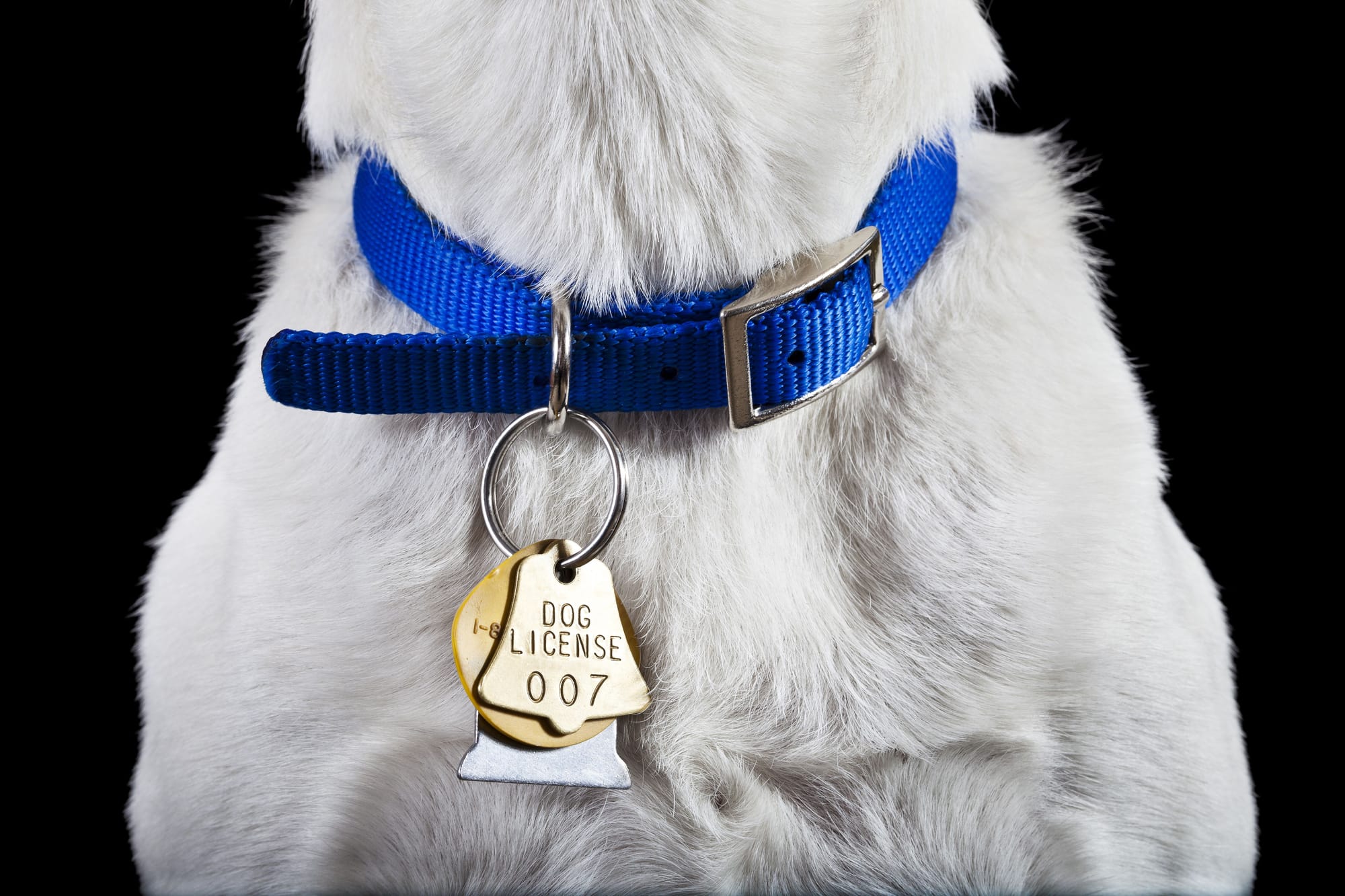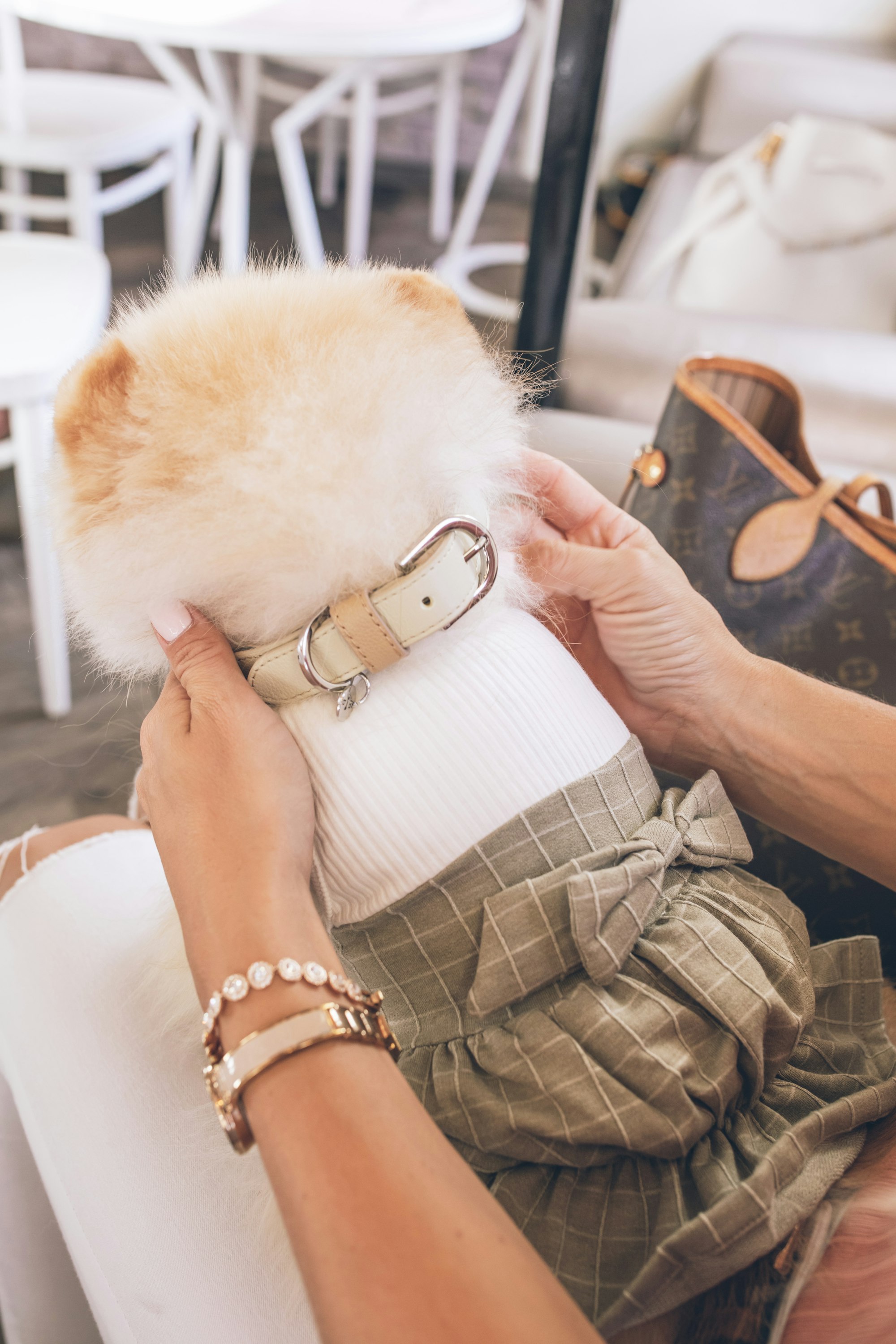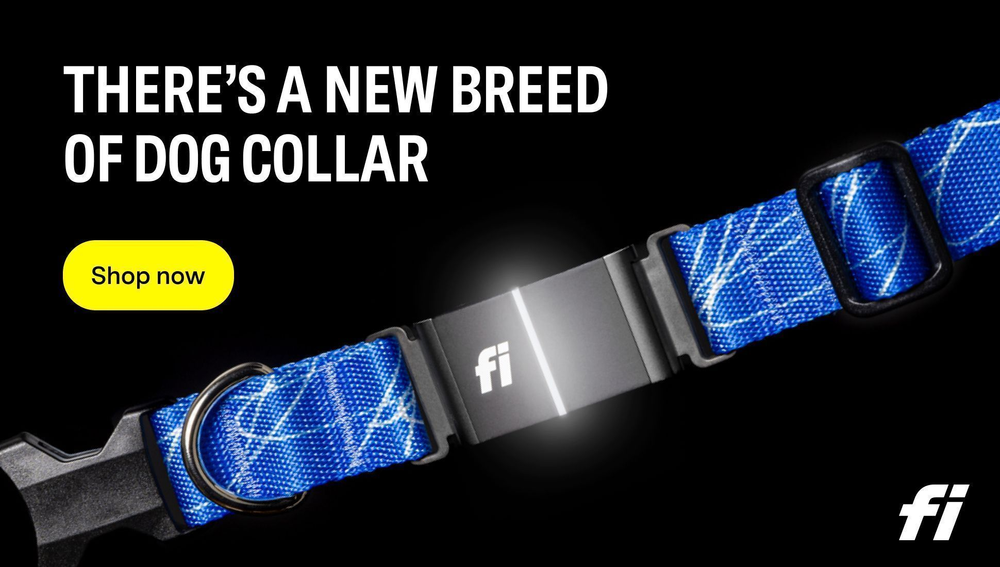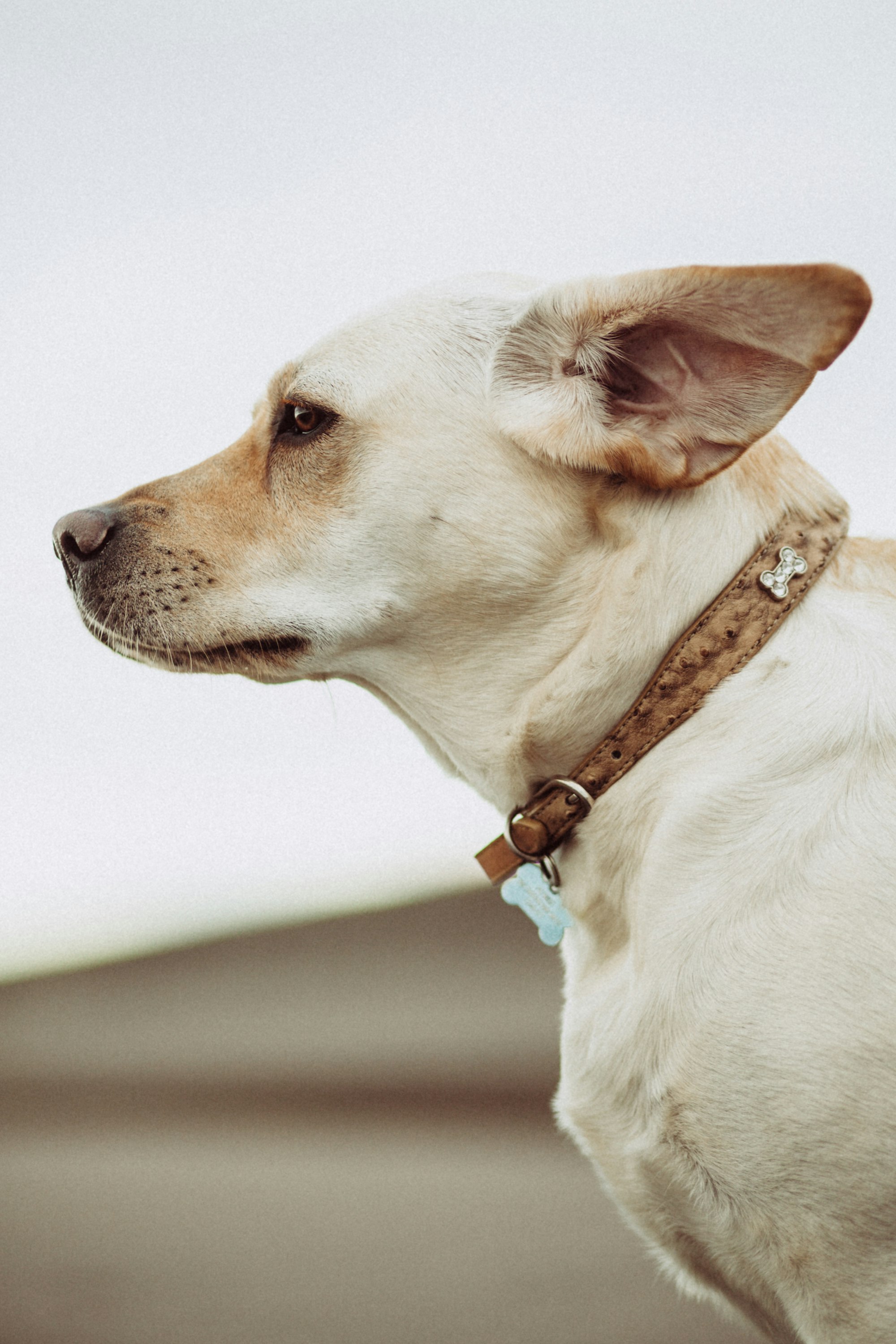Dog collars are an essential accessory for pet owners to keep their furry friends safe and secure. However, choosing the right material for a dog collar can be a daunting task. With so many options available in the market, it can be challenging to determine which materials work best for your dog's collar. In this article, we will explore some of the most commonly used materials for dog collars and their suitability for different purposes.

One of the primary factors to consider when selecting a material for a dog collar is its durability. A good quality collar should be sturdy enough to withstand the wear and tear of everyday use. Additionally, it should be comfortable for the dog to wear and not cause any irritation or discomfort. Depending on the dog's size, breed, and activity level, different materials may be more suitable than others. Therefore, it is crucial to choose a material that meets your dog's specific needs and requirements.
Another essential factor to consider when selecting a dog collar material is its purpose. Dog collars serve different purposes, such as identification, training, or control. For instance, a collar used for identification purposes may require a different material than a collar used for training. Therefore, it is essential to understand the intended use of the collar before selecting a material. By doing so, pet owners can ensure that they choose the best material that meets their dog's needs while also providing comfort and durability.

Types of Dog Collars
When it comes to dog collars, there are a variety of options available. Each type of collar is designed to serve a specific purpose, so it's important to choose the right one for your furry friend. Here are some of the most common types of dog collars:
Flat Collars
Flat collars are the most basic type of dog collar. They are simple, adjustable, and come in a variety of colors and designs. Flat collars are perfect for everyday use and can be used to attach identification tags and leashes.
Martingale Collars
Martingale collars are designed for dogs with narrow heads, such as Greyhounds and Whippets. They are also known as "limited slip" collars because they tighten slightly when the dog pulls on the leash. This prevents the collar from slipping off the dog's head.
Head Collars
Head collars, also known as "halters," are designed to give the owner more control over the dog's head. They work by applying pressure to the dog's muzzle, which can help prevent pulling and jumping. Head collars are not recommended for long-term use, as they can be uncomfortable for the dog.
Slip Collars
Slip collars, also known as "choke chains," are designed to tighten around the dog's neck when the owner pulls on the leash. They are not recommended for use on dogs with respiratory problems or neck injuries.
Aversive Collars
Aversive collars, such as shock collars and citronella collars, are designed to discourage unwanted behavior by delivering a punishment to the dog. These collars are controversial and should only be used as a last resort.
Smart Collars
Smart collars are a relatively new type of dog collar that come equipped with GPS tracking, activity monitoring, and other features. They are perfect for owners who want to keep tabs on their dog's whereabouts and health.
In conclusion, choosing the right type of collar for your dog is important for their safety and well-being. Consider the size and breed of your dog, as well as their individual needs and behavior, when selecting a collar.
Choosing the Right Material
When it comes to choosing a dog collar, there are many materials available in the market. Each material has its own set of advantages and disadvantages. Here are some of the most popular materials for dog collars and what you should know about them.
Nylon Collars
Nylon collars are a popular choice for many dog owners because they are lightweight, durable, and come in a variety of colors and designs. They are also easy to clean and maintain. However, nylon collars may not be suitable for dogs with sensitive skin or allergies.
Leather Collars
Leather collars are a classic choice that never goes out of style. They are durable, stylish, and can last for years if properly cared for. Leather collars are also comfortable for dogs to wear and are suitable for dogs with sensitive skin. However, leather collars can be expensive and may require more maintenance than other materials.
Neoprene Collars
Neoprene collars are made from a synthetic rubber material that is lightweight, durable, and water-resistant. They are also comfortable for dogs to wear and come in a variety of colors and designs. Neoprene collars are a good choice for dogs that love to swim or play in the water.
Biothane Collars
Biothane collars are made from a synthetic material that is similar to leather but is more durable and waterproof. They are easy to clean and maintain and come in a variety of colors and designs. Biothane collars are a good choice for dogs that love to play in the water or get dirty.
Hemp Collars
Hemp collars are made from a natural fiber that is eco-friendly and durable. They are also hypoallergenic and suitable for dogs with sensitive skin. Hemp collars are a good choice for dogs that need a collar that is both durable and environmentally friendly.
Rope Collars
Rope collars are made from a durable rope material that is lightweight and comfortable for dogs to wear. They are also easy to clean and maintain. Rope collars are a good choice for dogs that love to play and are suitable for dogs with sensitive skin.
When choosing a dog collar, it's important to consider your dog's individual needs and preferences. Each material has its own set of advantages and disadvantages, so it's important to choose the material that is best suited for your dog.
Design and Features
When it comes to dog collars, the design and features of the collar can make a big difference in both the comfort and safety of your furry friend. Here are some important factors to consider when choosing a collar:
Buckle Types
The buckle on a dog collar is an important feature that needs to be secure and easy to use. Snap buckles are a popular choice because they are quick and easy to fasten, while buckle collars offer a more secure fit. Some collars also feature martingale-style buckles, which can help prevent your dog from slipping out of the collar.
Adjustability
A collar that is adjustable can ensure a comfortable and secure fit for your dog. Look for collars with multiple sizing options or those made with stretchy materials to ensure a snug fit without being too tight. Adjustable collars are also useful for puppies who are still growing.
Identification Tags
Identification tags are an essential feature of any dog collar. They allow you to include your dog's name and your contact information in case your dog gets lost. Some collars even come with built-in identification tags or personalized collars that can be customized with your dog's information.
Reflective Elements
Collars with reflective elements can help keep your dog visible and safe during nighttime walks. Look for collars with reflective stitching or those made with reflective materials to ensure that your dog can be seen in low-light conditions.
Overall, the design and features of a dog collar can make a big difference in the safety and comfort of your furry friend. When choosing a collar, consider the buckle type, adjustability, identification tags, and reflective elements to ensure that you are getting the best collar for your dog's needs.
Comfort and Safety Considerations
When choosing a dog collar, comfort and safety are crucial considerations. The right collar will keep your dog secure and comfortable, without causing any harm or discomfort. Here are some important factors to consider when selecting a collar for your furry friend.
Padding and Lining
Collars with soft padding and lining are ideal for dogs with sensitive skin. Neoprene padding, in particular, is soft and comfortable, and won't rub or irritate your dog's skin. It's also durable and easy to clean, making it a great choice for active dogs.
Proper Sizing

Proper sizing is essential for both comfort and safety. A collar that is too loose can slip off, while a collar that is too tight can cause discomfort or even choking hazards. It's important to measure your dog's neck carefully and choose a collar that fits snugly but comfortably.
Pressure Distribution
Collars that distribute pressure evenly across the neck can prevent discomfort and injury. Look for collars with wide, flat bands that distribute pressure evenly, rather than narrow bands that can put too much pressure on one area.
Avoiding Choking Hazards
Some breeds, such as Greyhounds, have narrow necks that are more susceptible to choking hazards. It's important to choose a collar that won't constrict your dog's breathing or cause choking. Collars with quick-release buckles are a good option, as they can be easily removed in case of emergency.
By considering these factors and choosing the right collar for your dog's breed and size, you can ensure that your furry friend stays safe and comfortable while wearing their collar.
Durability and Maintenance
When it comes to dog collars, durability and maintenance are essential factors to consider. A good collar should be long-lasting and easy to maintain. In this section, we will discuss the three main aspects of durability and maintenance: water resistance, chew resistance, and ease of cleaning.
Water Resistance
A water-resistant collar is a must-have for dogs that love to swim or play in the rain. Collars made of materials such as nylon, neoprene, and rubber are great options for water-resistant collars. These materials repel water and prevent the collar from getting soaked. However, it's important to note that water-resistant collars are not waterproof. They can withstand light rain and splashes, but they may not hold up well if fully submerged in water.
Chew Resistance
Dogs are notorious chewers, and a collar that can withstand their chewing habits is crucial. Collars made of materials such as leather, metal, and heavy-duty nylon are great options for chew-resistant collars. These materials are durable and can withstand a dog's biting and chewing. However, it's important to note that no collar is completely chew-proof. If your dog is a heavy chewer, it's best to supervise them while they wear their collar.
Ease of Cleaning
A collar that is easy to clean is essential for maintaining good hygiene for your dog. Collars made of materials such as nylon and rubber are machine washable and easy to clean. Leather collars require more maintenance and should be wiped down with a damp cloth regularly. It's important to note that collars made of fabric materials may stretch out over time, so it's important to check the fit of the collar regularly.
In conclusion, when choosing a collar for your dog, it's important to consider the durability and maintenance of the materials used. Water-resistant collars made of materials such as nylon, neoprene, and rubber are great options for dogs that love to swim or play in the rain. Chew-resistant collars made of materials such as leather, metal, and heavy-duty nylon are great options for dogs that are heavy chewers. Collars made of materials such as nylon and rubber are easy to clean, while leather collars require more maintenance.
Style and Personalization
When it comes to dog collars, style and personalization are key factors to consider. A collar not only serves as a functional accessory but also a fashion statement for your furry friend. Here are some options to consider when choosing a stylish and personalized collar.
Color Variations
Collars come in a wide variety of colors to match your dog's personality and style. From bold and bright hues to subtle and neutral tones, there is a color to suit every taste. Some popular color choices for dog collars include red, blue, pink, green, and black. It is important to choose a color that complements your dog's coat and makes them stand out.
Pattern and Design Choices
In addition to color, patterns and designs can add a unique touch to your dog's collar. From stripes and polka dots to floral and animal prints, there is a pattern to suit every taste. Some collars even feature fun designs such as bones, paw prints, and hearts. When choosing a pattern or design, it is important to consider your dog's personality and style.
Custom Engraving
Personalizing your dog's collar with custom engraving is a great way to add a special touch. Engraving can include your dog's name, your phone number, or any other important information. This is particularly useful in case your dog gets lost or wanders off. Custom engraving is available on a variety of materials, including leather, nylon, and metal.
Overall, a stylish and personalized collar can make your dog look and feel great. With so many options available, it is easy to find a collar that matches your dog's personality and style.

Cost Considerations
When it comes to choosing a dog collar, cost is always a factor to consider. While there are many affordable options available, investing in a premium collar may be worth it in the long run.
Affordable Options
For those on a budget, there are plenty of affordable dog collars to choose from. Nylon and polyester collars are often the most affordable, with prices ranging from a few dollars to around $20. These collars are lightweight, durable, and come in a variety of colors and designs. However, they may not be as comfortable or long-lasting as more expensive options.
Investing in Premium Collars
Investing in a premium dog collar can provide benefits such as genuine leather, durability, and warranty. Genuine leather collars are often more expensive than nylon or polyester, but they are also more comfortable and long-lasting. Brands such as Orvis and Wolfgang Man & Beast offer personalized dog collars made from high-quality leather that can be customized with your dog's name and contact information.
In addition to leather, there are also other premium materials to consider, such as neoprene or biothane. These materials are often more durable and weather-resistant than nylon or polyester, making them a good choice for dogs who spend a lot of time outdoors.
When investing in a premium collar, it's important to consider the warranty offered by the manufacturer. Many premium brands offer warranties that cover defects in materials or workmanship, giving you peace of mind that your investment is protected.
Overall, while affordable options may be tempting, investing in a premium dog collar can provide long-term benefits in terms of comfort, durability, and warranty.
Collar Accessories and Attachments
When it comes to choosing the right collar for your furry friend, it's important to consider the accessories and attachments that can make it even more functional for your needs. Here are a few popular options to consider:
Leash Compatibility
Most dog owners use a leash to keep their pet close and under control while out on walks. When choosing a collar, it's important to consider whether it will be compatible with the type of leash you plan to use. For example, if you prefer a retractable leash, you'll want to choose a collar with a sturdy metal ring that can withstand the pulling force of the leash.
Harness Integration
Some dogs may benefit from wearing a harness in addition to a collar, especially if they have a tendency to pull or if they have any respiratory issues. If you plan to use a harness, look for collars that are designed to integrate with a harness, such as those with a front D-ring attachment.
Tracking and Technology
For pet owners who want to keep tabs on their furry friend's location and activity levels, there are a variety of tracking devices and smart collars available on the market. Some collars even have built-in GPS tracking, so you can always know where your pet is.
Overall, when choosing accessories and attachments for your dog's collar, it's important to consider your specific needs and the needs of your pet. By choosing the right combination of collar, leash, harness, and tracking device, you can help ensure your pet stays safe and comfortable while out and about.
Expert Insights and Reviews
Manufacturer Reputation
When it comes to choosing a dog collar, the reputation of the manufacturer can be a crucial factor. One of the most trusted brands in the market is Black Rhino Comfort Collar. They have been in the business for years and have a reputation for producing high-quality and durable collars. Their products are made with premium materials and are designed to provide maximum comfort to dogs.
Consumer Testimonials
Consumer testimonials are a great way to gauge the effectiveness of a dog collar. Many dog owners have reported positive experiences with the Black Rhino Comfort Collar. They have praised the collar's durability and comfort, as well as its ability to prevent chafing and irritation on their dogs' necks. Some users have also reported that the collar has helped to reduce pulling during walks.
Professional Recommendations
Professional dog trainers and veterinarians often have valuable insights into the best materials for dog collars. Many experts recommend collars made with nylon or leather, as these materials are durable and comfortable for dogs. The Black Rhino Comfort Collar is made with a soft neoprene padding that provides extra comfort and prevents irritation, making it a popular choice among professionals.
In terms of methodology, it is important to consider factors such as the size and breed of the dog, as well as their behavior and activity level. A collar that works well for one dog may not be suitable for another. It is always advisable to consult with a professional before choosing a collar for your dog.
Overall, the Black Rhino Comfort Collar is a great choice for dog owners who want a high-quality and durable collar that provides maximum comfort to their dogs. With its soft neoprene padding and durable construction, it is sure to last for years to come.

Frequently Asked Questions
- Q1: What are the most durable materials for making dog collars?
- When it comes to durability, materials such as leather, nylon, and biothane are some of the best options for making dog collars. Leather is known for its strength and durability, while nylon is a synthetic material that is resistant to wear and tear. Biothane, on the other hand, is a synthetic material that is extremely durable and resistant to water, dirt, and odors.
- Q2: Which dog collar materials are best for dogs with allergies or sensitive skin?
- Dogs with allergies or sensitive skin may benefit from collars made of natural materials such as hemp or cotton. These materials are breathable and hypoallergenic, which makes them less likely to cause skin irritation. Additionally, some synthetic materials such as biothane are also hypoallergenic and may be a good option for dogs with sensitive skin.
- Q3: How do leather and synthetic dog collar materials compare in terms of longevity and comfort?
- Leather is a natural material that is known for its durability and longevity. However, it can be more expensive than synthetic materials and may require more maintenance to keep it in good condition. Synthetic materials such as nylon and biothane are also durable and long-lasting, and may be more comfortable for some dogs due to their lightweight and flexible nature.
- Q4: What are the advantages of using biothane in dog collars?
- Biothane is a synthetic material that is extremely durable and resistant to water, dirt, and odors. It is also easy to clean and maintain, making it a popular choice for dog collars. Additionally, biothane is hypoallergenic and does not cause skin irritation, making it a good option for dogs with sensitive skin.
- Q5: Is hemp a good material for dog collars in terms of sustainability and comfort?
- Hemp is a natural material that is known for its sustainability and eco-friendliness. It is also breathable and hypoallergenic, which makes it a good option for dogs with allergies or sensitive skin. Additionally, hemp is a lightweight material that can be comfortable for dogs to wear.
- Q6: What factors should be considered when choosing the best fabric for a dog's collar?
- When choosing the best fabric for a dog's collar, factors such as durability, comfort, and safety should be considered. Natural materials such as leather, hemp, and cotton may be more comfortable and hypoallergenic, while synthetic materials such as nylon and biothane may be more durable and easy to maintain. It is also important to choose a collar that fits properly and does not cause any discomfort or irritation to the dog's skin.